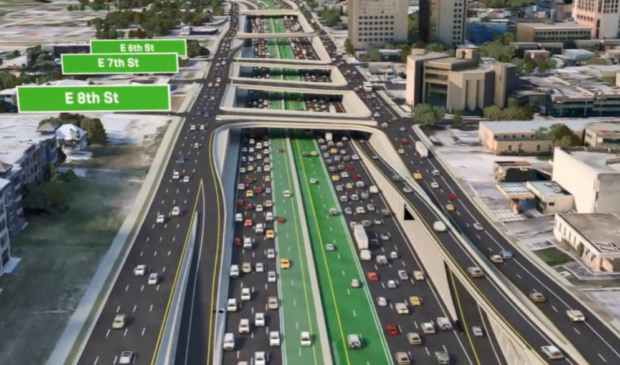I-35 expansion divides public opinion during economic downturn
Tuesday, April 28, 2020 by
Ryan Thornton The Texas Transportation Commission will vote Thursday to advance the state’s multibillion-dollar Capital Express Interstate 35 project despite the economic turmoil of Covid-19 and public concerns over the project’s financial viability.
“Given the current economic situation and the collapse in the oil market, our statewide fund balances, in all likelihood, will be too unstable to be reliable for some time to come,” said David Jones, executive director for the Lubbock Metropolitan Planning Organization. On behalf of the Lubbock planning agency’s policy board, Jones asked the commission during a public hearing on Friday either to delay or cancel its upcoming vote and explore other funding options before moving forward.
Echoing the financial alarm, Jeff Moseley, CEO of the Texas Association of Business, urged the commission to consider private financing options in lieu of tax dollars to get the project done, citing the “double-barrel economic challenge” of sinking oil production revenues and sales taxes, two primary sources of state transportation funds. Moseley said private investments could be repaid with toll fees from drivers opting to travel in the project’s added managed lanes.
“This project is perfectly suited to harvest private financing to get it built timely, and especially in these economic times, saving billions in tax dollars for other important needs around the state,” Moseley said.
Thursday’s vote would provide $3.4 billion for the project’s central stretch, leaving the state $940 million shy of its total $7.5 billion investment for all three pieces of the I-35 expansion. Capital Express Central could add two HOV lanes in each direction on I-35 from U.S. Highway 290 East to Ben White Boulevard and sink the interstate below surface level through Central Austin.
For now, state leaders have decided against tolling the new managed lanes while regional leaders, including Sen. Kirk Watson and Mayor Steve Adler, have made strong appeals in favor of using tolls to pay for the project and manage traffic demand.
Noting the extremely low levels of traffic as more people than ever are working from home, Heyden Black Walker, board chair of Reconnect Austin, said the Texas Department of Transportation should consider addressing demand with traffic management strategies like telecommuting programs rather than attempting to solve the traffic problem by adding more supply with road expansion projects.
Due to a technical difficulty, Adam Greenfield of Walk Austin was not able to speak to the commission Friday, but sent written comments asking the commission to remove any plans that include widening I-35 as part of the redesign. He told the Austin Monitor that an expansion would only increase travel time for many by encouraging more sprawl while having an unpredictable impact on traffic congestion.
Greenfield cited a recent Transportation for America study called “The Congestion Con” as evidence for his predictions. After analyzing numerous highway expansion projects across the nation, the study claims there is “little to no evidence that widening roads is helping reduce delay or congestion.”
Greenfield said he is asking for a transparent public process in coordination with the city of Austin so that all of the options and potential impacts are taken into account before deciding on the appropriate solution. The current timeline, with the financial allocation coming before the final design work and public process, is “ill-advised,” he said.
“(The Texas Transportation Commission) and TxDOT have a long history of doing what they want and not listening to cities and communities and this does not send a very good sign that they’re listening,” Greenfield said. “It’s weird and frightening, frankly, that they’re coming up with money when they haven’t got a design.”
However, other stakeholders, including Geoffrey Tahuahua of the Real Estate Council of Austin, Shaun Cranston of the Austin Chamber of Commerce and Clarke Heidrick of the Austin Area Research Organization, were strongly supportive of the state’s decision to fund the bulk of the project.
“Although we are currently operating in an extraordinary environment, we believe this project is so vitally important that we must continue to focus on providing mobility solutions for our region,” said Cranston.
On April 20, the Capital Area Metropolitan Planning Organization committed to dedicate $633 million of the project’s remaining $940 million gap should the commission approve the funds on Thursday. The commission would vote to add the remaining $300 million to its 2021 Unified Transportation Program in August.
Rendering by TxDOT.
The Austin Monitor’s work is made possible by donations from the community. Though our reporting covers donors from time to time, we are careful to keep business and editorial efforts separate while maintaining transparency. A complete list of donors is available here, and our code of ethics is explained here.
You're a community leader
And we’re honored you look to us for serious, in-depth news. You know a strong community needs local and dedicated watchdog reporting. We’re here for you and that won’t change. Now will you take the powerful next step and support our nonprofit news organization?










